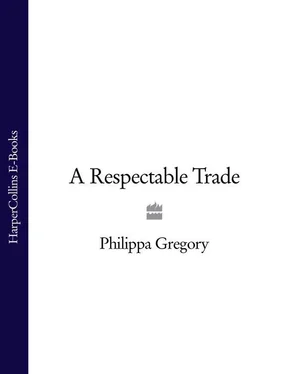The more Mehuru heard, the more certain he became that the Yoruba states were right to stand against slavery. The wickedness of slavery, its random cruelty, no longer disturbed him as much as the threat to the whole future of the continent which was opening before him like a vision of hell: a country ruled by the gun for the convenience of strangers, where no-one could be safe.
‘If slavery is such a bad thing,’ Siko said one night as they lay together under the dark sky, ‘I suppose you’ll be setting me free as soon as we get back to Oyo.’
Mehuru reached out a foot and kicked him gently. ‘You buy yourself out as we agreed,’ he said. ‘You’ve been robbing me blind for years anyway.’
He smiled as he slept; but in the night, under the innocent arch of the sky, he dreamed of the ship again. He dreamed of it cruising in warm shallow water, its deck misshapen by a thatched shelter, the sides shuttered with nets. In its wake were occasional dark, triangular fins. There were sharks following the ship, drawn through the seas by the garbage thrown overboard, and by the promising smell of sickness and despair. They could scent blood and the likelihood of death. The prow sliced through the clean water like a knife into flesh, and its wake was like a wound. Mehuru started awake and found that he was sweating as if he had been running in terror. It was the ship again, his nightmare ship.
He woke Siko. It was nearly dawn, he wanted the company of the boy. ‘Let’s go and swim,’ he said. ‘Let’s go down to the river.’
The boy was reluctant to get up, warning of crocodiles and hippos in the river, and poisonous snakes on the path. Mehuru caught the edge of the boy’s cloak and rolled him out.
‘Come on,’ he said impatiently. He wanted to wash the dream away, he wanted to play like a child in the water and then run back and eat porridge for breakfast. They had camped in the bend of a river and slept on the dry bank. Mehuru left his things by the embers of last night’s fire and jogged, half-naked, to the river. Siko trotted behind him, still complaining. The coolness of the morning air cleared his head, he could feel his breath coming faster and the dark ominous shadow of the ship receding.
Ahead of them was the river, fringed with trees, the tall nodding heads of the rhun palm making a continual comforting clatter as the dried leaves pattered against each other. He ran between an avenue of locust bean trees, the broad gnarled trunks on either side of him, the fluttering feathery leaves brushing the top of his head. He could see the river, the green water gleaming through the thick undergrowth. A flock of plantain eaters swooped overhead, pied birds calling coop-coop-coop in a melodic chatter, and brightly coloured parrots flew up as Mehuru and Siko ran easily side by side. Mehuru’s feet scrunched on white sand and he was pausing to catch his breath and to check the water for crocodile or hippo when he saw, from the corner of his eye, a shadow launch forward and in the same moment he was buffeted by a blow which flung him to the ground.
He struggled to get his arms free but he was winded and helpless under the weight of his attacker. He heard another man running forwards and saw a club rising above him and he cried out in terror, ‘Siko! Run! Run!’ as the blow crushed his head and flung him into fragments of darkness.
His last thought, as the dark shape of the nightmare ship rose up in his mind to blot out the sunlight and the gleam of the green water, was that he, of all people, should have known how far inland the slavers might have come.
At Mrs Daley’s house, Dowry Parade, the Hot Well, Bristol .
11th November 1787
Dear Frances ,
I am Writing this before I leave for London as I Know you would want to Know at once my thoughts on Mr Josiah Cole .
I find him a Plain and simple Man, on whose Word I think we can Rely. I have had sight of his Company books and he seems to be well-established, tho’ he is not a member of the Merchant Adventurers nor of the Africa Company, which is a regret to him. However, the Friends you can bring may Rectify the Omission .
He was Not demanding as to your Dowry and we have settled matters to our Satisfaction. I have taken a Share, on your behalf, in the cargo of one of his ships, the Daisy, which is loading off Africa in this Month. Another of his ships, the Lily, came into port while I was there and I watched the unloading of his Wealth in the Form of Sugar and Rum. It is a Risky business, but highly profitable. I have no Hesitation in believing that you will be well Provided for during your Marriage; and if Widowed, you will Enjoy an adequate jointure. We have Agreed that there is no haste for the Marriage and since you have to complete your contract with Mrs Snelling, and he hopes to Buy a house Suitable for his new Family, we have fixed it for the month of July next year. It is Not what your father would have wished, but I Agree with you that it is the best you can Anticipate .
As to the Pupils you were to teach, he made no Mention of them, except as a Scheme he had in Mind for later. My principal concern was your Sister-in-law, Miss Sarah Cole, who does not Seem to welcome the Match. However, you will have Dealt with more Intractable domestic situations at Home and with Mrs Snelling .
I shall be home within the Sennight, and will drive over to Mrs Snelling’s house to discuss the matter with you then .
Yours ,
Scott .
Mehuru regained consciousness with an aching head and flies buzzing about the blood on his temple. His arms were bound behind him and his neck was lashed into a forked wooden brace with rough hemp twine. At his side was Siko, whimpering pitifully, his neck-brace paired with Mehuru’s so that they were bound together like some misshapen yam which sprouts a twin. They were whipped to their feet and then directed down the river path to where their captors had hidden their boats. Every stumble Siko made tore Mehuru’s neck and knocked him from his stride. They fell together in a helpless embrace and were whipped until they stood again. Only when they fell into a slavish head-bowed shuffle could they move forward, and even then both their necks were rubbed through bruises into bleeding sores. ‘I am sorry, sir, I am sorry,’ Siko wept. ‘I am sorry.’
‘It is I who am sorry,’ Mehuru said only once as they struggled to their feet. ‘I brought you far from your home and mine, I should have taken more care. I did not know that they had come this far inland.’
He did not finish his thought: that it was not only Siko whom he had failed. If the slavers were raiding this far inland then the whole of Africa was open to them and Mehuru could not send a warning. ‘The gods only know what will be the end of this,’ he said to himself. He was worried for the Yoruba kingdom and for its plan to boycott the slave trade. He did not yet know enough to fear for himself.
Siko wept like a little child, but Mehuru stayed calm. He knew that while they were within the borders of the Yoruba states his authority would be recognised. The men who had captured them were ignorant violent peasants of the worst sort. Mehuru tried to speak to them in all the African languages he knew but they answered him only with a threatening wave of a cudgel. He decided to wait until they reached their base camp. As soon as they reached their master, Mehuru would explain who he was and they would be released. In his more optimistic moments Mehuru thought what an excellent anecdote this would make back at the court, and what a hero he would seem: fighting slavery and personally endangered.
It took three days walking downriver to where the slavers’ boats were waiting, and at every halt the slavers went out and hunted down another man, another woman, another little child. Mehuru’s opposition to the slave trade had been theoretical; but when he saw the women sick with fear and the children too terrified to weep he knew that he hated the Trade and would be against it all his life. Then he longed to be back at court – not only to boast of his escape, but to add his voice to the counsels against slavery. He had heard it named as a sin but when he saw the whipping and the casual brutality, he understood for the first time in a comfortable leisured life what a mortal sin could mean.
Читать дальше












